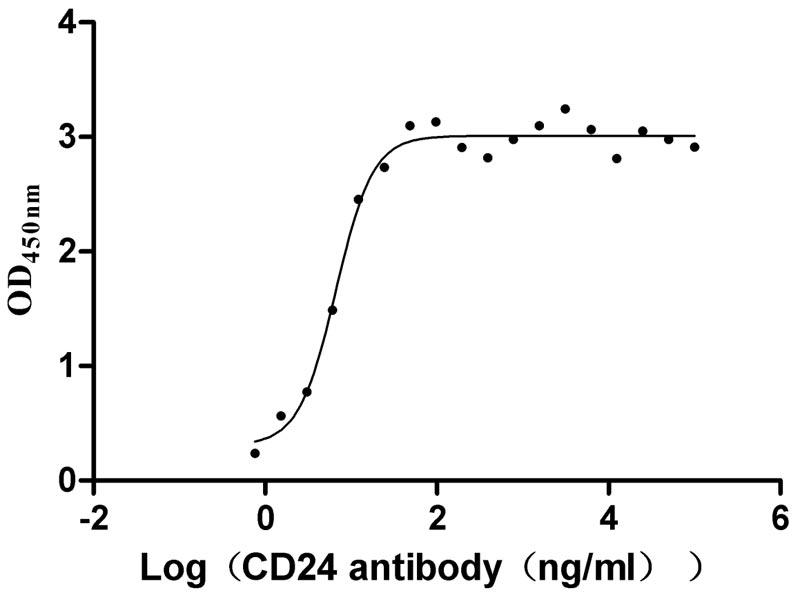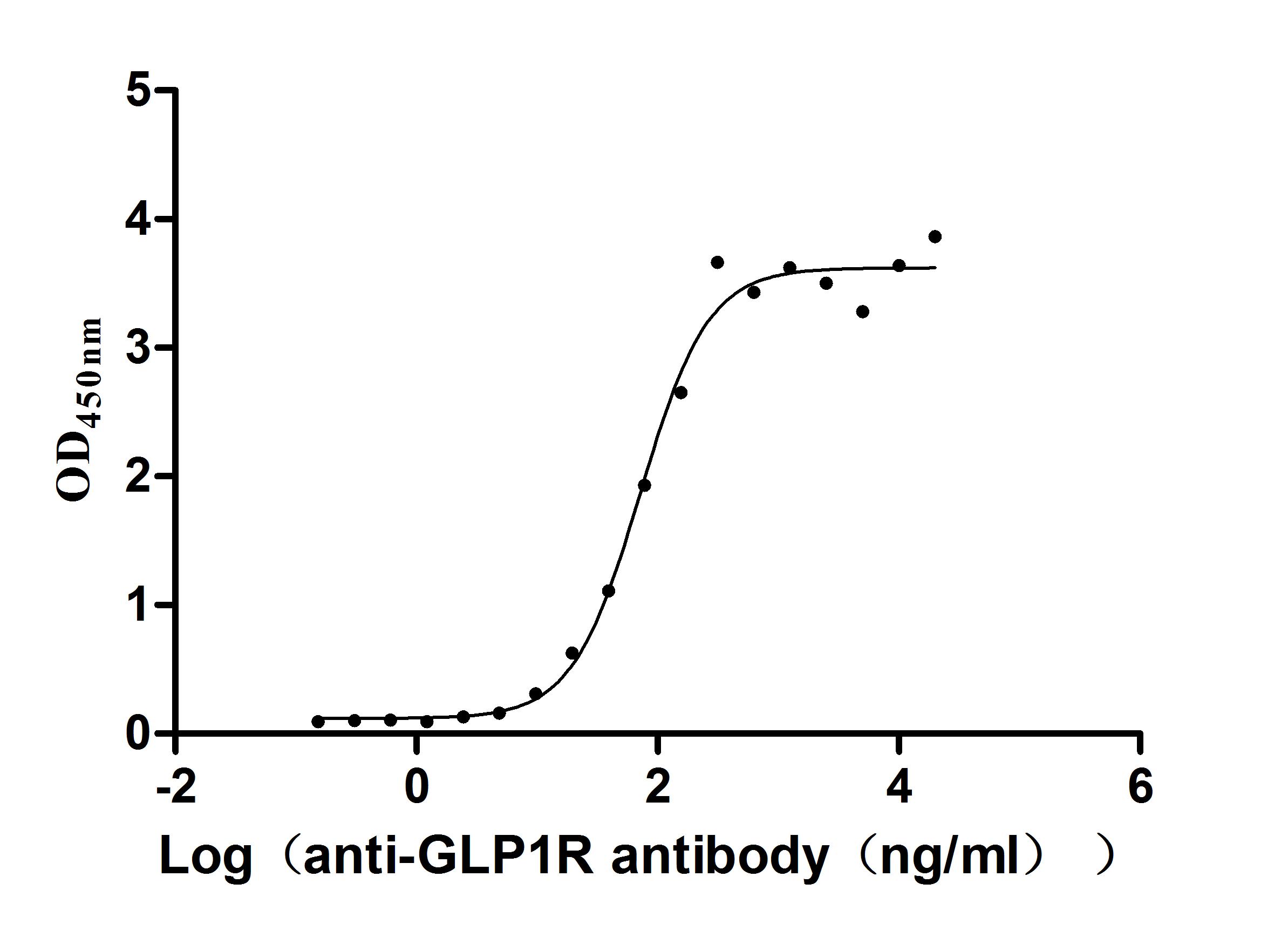Recombinant Rubella virus Structural polyprotein, partial
-
中文名稱:Recombinant Rubella virus Structural polyprotein,partial,Yeast
-
貨號:CSB-YP362458RHT1
-
規(guī)格:
-
來源:Yeast
-
其他:
-
中文名稱:Recombinant Rubella virus Structural polyprotein,partial,Yeast
-
貨號:CSB-EP362458RHT1
-
規(guī)格:
-
來源:E.coli
-
其他:
-
中文名稱:Recombinant Rubella virus Structural polyprotein,partial,Yeast
-
貨號:CSB-EP362458RHT1-B
-
規(guī)格:
-
來源:E.coli
-
共軛:Avi-tag Biotinylated
E. coli biotin ligase (BirA) is highly specific in covalently attaching biotin to the 15 amino acid AviTag peptide. This recombinant protein was biotinylated in vivo by AviTag-BirA technology, which method is BriA catalyzes amide linkage between the biotin and the specific lysine of the AviTag.
-
其他:
-
中文名稱:Recombinant Rubella virus Structural polyprotein,partial,Yeast
-
貨號:CSB-BP362458RHT1
-
規(guī)格:
-
來源:Baculovirus
-
其他:
-
中文名稱:Recombinant Rubella virus Structural polyprotein,partial,Yeast
-
貨號:CSB-MP362458RHT1
-
規(guī)格:
-
來源:Mammalian cell
-
其他:
產(chǎn)品詳情
-
純度:>85% (SDS-PAGE)
-
基因名:N/A
-
Uniprot No.:
-
別名:Structural polyprotein; p110
-
種屬:Rubella virus (strain TO-336) (RUBV)
-
蛋白長度:Partial
-
蛋白標(biāo)簽:Tag?type?will?be?determined?during?the?manufacturing?process.
The tag type will be determined during production process. If you have specified tag type, please tell us and we will develop the specified tag preferentially. -
產(chǎn)品提供形式:Lyophilized powder
Note: We will preferentially ship the format that we have in stock, however, if you have any special requirement for the format, please remark your requirement when placing the order, we will prepare according to your demand. -
復(fù)溶:We recommend that this vial be briefly centrifuged prior to opening to bring the contents to the bottom. Please reconstitute protein in deionized sterile water to a concentration of 0.1-1.0 mg/mL.We recommend to add 5-50% of glycerol (final concentration) and aliquot for long-term storage at -20℃/-80℃. Our default final concentration of glycerol is 50%. Customers could use it as reference.
-
儲存條件:Store at -20°C/-80°C upon receipt, aliquoting is necessary for mutiple use. Avoid repeated freeze-thaw cycles.
-
保質(zhì)期:The shelf life is related to many factors, storage state, buffer ingredients, storage temperature and the stability of the protein itself.
Generally, the shelf life of liquid form is 6 months at -20°C/-80°C. The shelf life of lyophilized form is 12 months at -20°C/-80°C. -
貨期:Delivery time may differ from different purchasing way or location, please kindly consult your local distributors for specific delivery time.Note: All of our proteins are default shipped with normal blue ice packs, if you request to ship with dry ice, please communicate with us in advance and extra fees will be charged.
-
注意事項:Repeated freezing and thawing is not recommended. Store working aliquots at 4°C for up to one week.
-
Datasheet :Please contact us to get it.
相關(guān)產(chǎn)品
靶點詳情
-
功能:Capsid protein interacts with genomic RNA and assembles into icosahedric core particles 65-70 nm in diameter. The resulting nucleocapsid eventually associates with the cytoplasmic domain of E2 at the cell membrane, leading to budding and formation of mature virions from host Golgi membranes. Phosphorylation negatively regulates RNA-binding activity, possibly delaying virion assembly during the viral replication phase. Capsid protein dimerizes and becomes disulfide-linked in the virion. Modulates genomic RNA replication. Modulates subgenomic RNA synthesis by interacting with human C1QBP/SF2P32. Induces both perinuclear clustering of mitochondria and the formation of electron-dense intermitochondrial plaques, both hallmarks of rubella virus infected cells. Induces apoptosis when expressed in transfected cells.; Responsible for viral attachment to target host cell, by binding to the cell receptor. Its transport to the plasma membrane depends on interaction with E1 protein. The surface glycoproteins display an irregular helical organization and a pseudo-tetrameric inner nucleocapsid arrangement.; Class II viral fusion protein. Fusion activity is inactive as long as E1 is bound to E2 in mature virion. After virus attachment to target cell and clathrin-mediated endocytosis, acidification of the endosome would induce dissociation of E1/E2 heterodimer and concomitant trimerization of the E1 subunits. This E1 homotrimer is fusion active, and promotes release of viral nucleocapsid in cytoplasm after endosome and viral membrane fusion. The cytoplasmic tail of spike glycoprotein E1 modulates virus release. The surface glycoproteins display an irregular helical organization and a pseudo-tetrameric inner nucleocapsid arrangement.
-
亞細胞定位:[Capsid protein]: Virion. Host cytoplasm. Host mitochondrion.; [Spike glycoprotein E2]: Virion membrane; Single-pass type I membrane protein. Host Golgi apparatus membrane; Single-pass type I membrane protein.; [Spike glycoprotein E1]: Virion membrane; Single-pass type I membrane protein. Host Golgi apparatus membrane; Single-pass type I membrane protein.
Most popular with customers
-
Recombinant Human Lymphotoxin-alpha (LTA) (Active)
Express system: Mammalian cell
Species: Homo sapiens (Human)
-
Recombinant Human Signal transducer CD24 (CD24)-Nanoparticle (Active)
Express system: Mammalian cell
Species: Homo sapiens (Human)
-
Recombinant Dog B-lymphocyte antigen CD20 (MS4A1)-VLPs (Active)
Express system: Mammalian cell
Species: Canis lupus familiaris (Dog) (Canis familiaris)
-
Recombinant Human Glucagon-like peptide 1 receptor (GLP1R), partial (Active)
Express system: Mammalian cell
Species: Homo sapiens (Human)
-
Recombinant Mouse Cell adhesion molecule 1 (Cadm1), partial (Active)
Express system: Mammalian cell
Species: Mus musculus (Mouse)
-
Recombinant Human Early activation antigen CD69 (CD69), partial (Active)
Express system: Mammalian cell
Species: Homo sapiens (Human)
-
Recombinant Macaca fascicularis C-type lectin domain family 4 member C(CLEC4C), partial (Active)
Express system: Mammalian cell
Species: Macaca fascicularis (Crab-eating macaque) (Cynomolgus monkey)
-
Recombinant Human Cadherin-1(CDH1),partial (Active)
Express system: Mammalian cell
Species: Homo sapiens (Human)




















